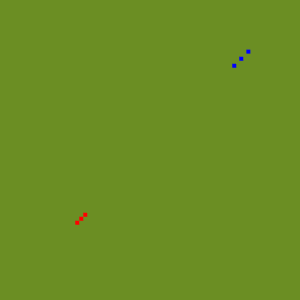KMeansClustering
Repository source: KMeansClustering
Description¶
This example clusters 3D points using the KMeans algorithm. The points are assigned to a cluster by creating an array with each point's cluster id.
Other languages
See (PythonicAPI)
Question
If you have a question about this example, please use the VTK Discourse Forum
Code¶
KMeansClustering.cxx
#include <vtkActor.h>
#include <vtkDoubleArray.h>
#include <vtkIntArray.h>
#include <vtkInteractorStyleTrackballCamera.h>
#include <vtkKMeansStatistics.h>
#include <vtkMultiBlockDataSet.h>
#include <vtkNamedColors.h>
#include <vtkNew.h>
#include <vtkPointData.h>
#include <vtkPoints.h>
#include <vtkPolyData.h>
#include <vtkPolyDataMapper.h>
#include <vtkProperty.h>
#include <vtkRenderWindow.h>
#include <vtkRenderWindowInteractor.h>
#include <vtkRenderer.h>
#include <vtkTable.h>
#include <vtkVertexGlyphFilter.h>
#include <vtkXMLPolyDataWriter.h>
#include <iostream>
#include <sstream>
int main(int, char*[])
{
vtkNew<vtkNamedColors> colors;
// Create 2 clusters, one near (0,0,0) and the other near (3,3,3).
vtkNew<vtkPoints> points;
points->InsertNextPoint(0.0, 0.0, 0.0);
points->InsertNextPoint(3.0, 3.0, 3.0);
points->InsertNextPoint(0.1, 0.1, 0.1);
points->InsertNextPoint(3.1, 3.1, 3.1);
points->InsertNextPoint(0.2, 0.2, 0.2);
points->InsertNextPoint(3.2, 3.2, 3.2);
// Get the points into the format needed for KMeans.
vtkNew<vtkTable> inputData;
for (int c = 0; c < 3; ++c)
{
std::stringstream colName;
colName << "coord " << c;
vtkNew<vtkDoubleArray> doubleArray;
doubleArray->SetNumberOfComponents(1);
doubleArray->SetName(colName.str().c_str());
doubleArray->SetNumberOfTuples(points->GetNumberOfPoints());
for (int r = 0; r < points->GetNumberOfPoints(); ++r)
{
double p[3];
points->GetPoint(r, p);
doubleArray->SetValue(r, p[c]);
}
inputData->AddColumn(doubleArray);
}
vtkNew<vtkKMeansStatistics> kMeansStatistics;
kMeansStatistics->SetInputData(vtkStatisticsAlgorithm::INPUT_DATA, inputData);
kMeansStatistics->SetColumnStatus(inputData->GetColumnName(0), 1);
kMeansStatistics->SetColumnStatus(inputData->GetColumnName(1), 1);
kMeansStatistics->SetColumnStatus(inputData->GetColumnName(2), 1);
// kMeansStatistics->SetColumnStatus( "Testing", 1 );
kMeansStatistics->RequestSelectedColumns();
kMeansStatistics->SetAssessOption(true);
kMeansStatistics->SetDefaultNumberOfClusters(2);
kMeansStatistics->Update();
// Display the results.
kMeansStatistics->GetOutput()->Dump();
vtkNew<vtkIntArray> clusterArray;
clusterArray->SetNumberOfComponents(1);
clusterArray->SetName("ClusterId");
for (int r = 0; r < kMeansStatistics->GetOutput()->GetNumberOfRows(); r++)
{
vtkVariant v = kMeansStatistics->GetOutput()->GetValue(
r, kMeansStatistics->GetOutput()->GetNumberOfColumns() - 1);
std::cout << "Point " << r << " is in cluster " << v.ToInt() << std::endl;
clusterArray->InsertNextValue(v.ToInt());
}
// Output the cluster centers.
auto outputMetaDS =
dynamic_cast<vtkMultiBlockDataSet*>(kMeansStatistics->GetOutputDataObject(
vtkStatisticsAlgorithm::OUTPUT_MODEL));
auto outputMeta = dynamic_cast<vtkTable*>(outputMetaDS->GetBlock(0));
auto coord0 =
dynamic_cast<vtkDoubleArray*>(outputMeta->GetColumnByName("coord 0"));
auto coord1 =
dynamic_cast<vtkDoubleArray*>(outputMeta->GetColumnByName("coord 1"));
auto coord2 =
dynamic_cast<vtkDoubleArray*>(outputMeta->GetColumnByName("coord 2"));
std::cout << "Cluster centers:" << std::endl;
for (unsigned int i = 0; i < coord0->GetNumberOfTuples(); ++i)
{
std::cout << "Cluster " << i << ": " << coord0->GetValue(i) << " "
<< coord1->GetValue(i) << " " << coord2->GetValue(i) << ")"
<< std::endl;
}
vtkNew<vtkPolyData> polydata;
polydata->SetPoints(points);
// polydata->GetPointData()->AddArray(clusterArray);
polydata->GetPointData()->SetScalars(clusterArray);
vtkNew<vtkXMLPolyDataWriter> writer;
writer->SetFileName("output.vtp");
writer->SetInputData(polydata);
writer->Write();
// Display
vtkNew<vtkVertexGlyphFilter> glyphFilter;
glyphFilter->SetInputData(polydata);
glyphFilter->Update();
// Create a mapper and actor.
vtkNew<vtkPolyDataMapper> mapper;
mapper->SetInputConnection(glyphFilter->GetOutputPort());
vtkNew<vtkActor> actor;
actor->SetMapper(mapper);
actor->GetProperty()->SetPointSize(10);
actor->GetProperty()->RenderPointsAsSpheresOn();
// Create a renderer, render window, and interactor.
vtkNew<vtkRenderer> renderer;
vtkNew<vtkRenderWindow> renderWindow;
renderWindow->AddRenderer(renderer);
renderWindow->SetSize(600, 600);
renderWindow->SetWindowName("KMeansClustering");
vtkNew<vtkRenderWindowInteractor> renderWindowInteractor;
renderWindowInteractor->SetRenderWindow(renderWindow);
// Add the actor to the scene
renderer->AddActor(actor);
renderer->SetBackground(colors->GetColor3d("OliveDrab").GetData());
vtkNew<vtkInteractorStyleTrackballCamera> style;
renderWindowInteractor->SetInteractorStyle(style);
// Render and interact
renderWindow->Render();
renderWindowInteractor->Start();
return EXIT_SUCCESS;
}
CMakeLists.txt¶
cmake_minimum_required(VERSION 3.12 FATAL_ERROR)
project(KMeansClustering)
find_package(VTK COMPONENTS
CommonColor
CommonCore
CommonDataModel
FiltersGeneral
FiltersStatistics
IOXML
InteractionStyle
RenderingContextOpenGL2
RenderingCore
RenderingFreeType
RenderingGL2PSOpenGL2
RenderingOpenGL2
)
if (NOT VTK_FOUND)
message(FATAL_ERROR "KMeansClustering: Unable to find the VTK build folder.")
endif()
# Prevent a "command line is too long" failure in Windows.
set(CMAKE_NINJA_FORCE_RESPONSE_FILE "ON" CACHE BOOL "Force Ninja to use response files.")
add_executable(KMeansClustering MACOSX_BUNDLE KMeansClustering.cxx )
target_link_libraries(KMeansClustering PRIVATE ${VTK_LIBRARIES}
)
# vtk_module_autoinit is needed
vtk_module_autoinit(
TARGETS KMeansClustering
MODULES ${VTK_LIBRARIES}
)
Download and Build KMeansClustering¶
Click here to download KMeansClustering and its CMakeLists.txt file. Once the tarball KMeansClustering.tar has been downloaded and extracted,
cd KMeansClustering/build
If VTK is installed:
cmake ..
If VTK is not installed but compiled on your system, you will need to specify the path to your VTK build:
cmake -DVTK_DIR:PATH=/home/me/vtk_build ..
Build the project:
make
and run it:
./KMeansClustering
WINDOWS USERS
Be sure to add the VTK bin directory to your path. This will resolve the VTK dll's at run time.
